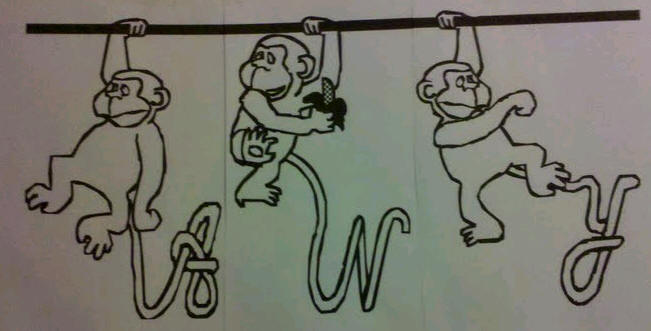| DIY Hanging Monkeys Classroom Banner |
|---|
| www.studenthandouts.com ↣ Classroom Organization ↣ Classroom Signs |
 |
|
Here you go...more fun than a barrel full of monkeys are these alphabet monkeys hanging from your classroom wall or ceiling. Each letter of the alphabet fits a sheet of paper. Simply print the pages (letters) that you need to spell out a word or name. L-I-B-R-A-R-Y designates your classroom's reading area, etc. We have even seen parents print out the letters of a child's name, have the child color each sheet, then place each sheet in an inexpensive document frame to decorate the child's bedroom wall. Neat, huh? Click here to print: Black - Blue - Brown - Purple Monkeys are known for their playful behavior, and several factors contribute to their playful nature: Cognitive Development: Many monkey species, especially primates like chimpanzees and bonobos, have highly developed brains. Play is an essential part of cognitive development for young monkeys, helping them learn problem-solving skills, social interaction, and how to navigate their environment. Social Learning: Play allows young monkeys to observe and learn from their peers and adult members of the group. They mimic behaviors, test boundaries, and develop social skills through play interactions. Bonding and Social Cohesion: Play helps strengthen social bonds within monkey groups. Through play, monkeys build trust, establish hierarchies, and maintain harmonious relationships within their communities. Physical Fitness: Playful activities, such as climbing, swinging, and chasing, help young monkeys develop strength, coordination, and agility. These physical skills are essential for survival in their natural habitat. Problem Solving: Play often involves activities that resemble problem-solving tasks. Monkeys engage in activities like manipulating objects, exploring their surroundings, and figuring out how things work--all of which contribute to their cognitive development. Release of Energy: Monkeys are highly active animals, and play provides an outlet for their abundant energy. It allows them to expend energy, which can be particularly important for young monkeys with high activity levels. Stress Relief: Play can serve as a stress-relief mechanism for monkeys. Engaging in playful activities can help reduce tension and anxiety within the group, promoting a more relaxed social environment. Exploration and Curiosity: Playful behavior encourages exploration and curiosity about the environment. Young monkeys learn about food sources, potential dangers, and new experiences through their playful interactions with objects and surroundings. Communication Practice: Play often involves vocalizations, facial expressions, and body language. These playful interactions serve as a form of communication practice, helping monkeys refine their social communication skills. Enjoyment and Pleasure: Play is intrinsically enjoyable for monkeys, as it provides a sense of fun and pleasure. It's not solely driven by practical benefits but also by the sheer joy of engaging in playful activities. Life Skills: Many play behaviors mimic activities that are essential for survival and reproduction. For example, play fighting can prepare young monkeys for future competition and mating. Species-Specific Variation: Different monkey species exhibit varying degrees of playfulness. Some species are known for their exuberant play, while others may engage in more subdued or infrequent play, depending on their social structure and ecological niche. Individual Variation: Just like humans, individual monkeys can have different levels of playfulness. Some individuals may be more inclined to engage in play than others, influenced by factors like temperament and social interactions. In summary, monkeys are playful due to a combination of factors, including cognitive development, social learning, physical fitness, problem-solving, and the enjoyment they derive from playful activities. Play is an integral part of their lives, serving both practical and social functions while contributing to their overall well-being and development. |
 |  |  |  |  |  |
| www.studenthandouts.com ↣ Classroom Organization ↣ Classroom Signs |














































